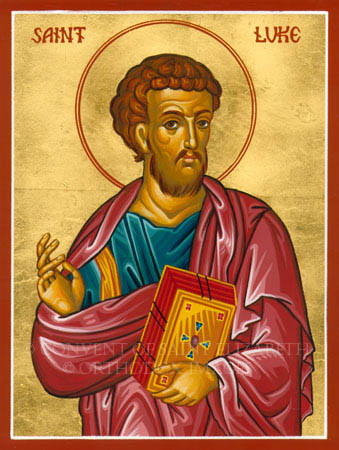The Life of the Evangelist Luke
 Luke, a physician of Antioch, was not unacquainted with Greek culture, as is shown by his writings. He was a companion of the Apostle Paul and followed him in all his journeys to foreign lands. Luke wrote the Gospel to which Paul himself refers when he says, And we have sent with him the brother, whose praise is in the Gospel throughout all the churches (II Cor. 8:18). And in his letter to the Colossians he says, Luke, the beloved physician, greets you (Col. 4:14). And to Timothy he says, Only Luke is with me (II Tim. 4:11).
Luke, a physician of Antioch, was not unacquainted with Greek culture, as is shown by his writings. He was a companion of the Apostle Paul and followed him in all his journeys to foreign lands. Luke wrote the Gospel to which Paul himself refers when he says, And we have sent with him the brother, whose praise is in the Gospel throughout all the churches (II Cor. 8:18). And in his letter to the Colossians he says, Luke, the beloved physician, greets you (Col. 4:14). And to Timothy he says, Only Luke is with me (II Tim. 4:11).
Luke wrote another excellent book entitled The Acts of the Apostles, a history which ends with Paul’s two-year stay in Rome, that is, in the fourth year of Nero’s reign. This leads us to believe that The Acts of the Apostles was written in Rome. The tale of the journey of Paul and Thecla, and every other fable, such as the baptism of the lion, should not be counted among the canonical Scriptures. For it is not possible that he who was inseparable from the Apostle should not have known of this act among all his other acts. Tertullian also mentions a certain elder in Asia at that time, a companion of the Apostle Paul, who, when it was proven in the presence of John that he was the author of this book, confessed that he had written it out of love for Paul. Some say that this is why Luke does not mention himself as the author. Whenever Paul says in his own Epistles, according to my Gospel (Rom. 2:16, etc.), it is clear that he means the Gospel written by Luke. But Luke learned the Gospel not only from the Apostle Paul, who was not with the Lord in the body at that time, but from the other Apostles as well. He himself clearly states this at the beginning of his work, saying, even as they were handed down to us by those who from the beginning were eyewitnesses. Therefore he wrote the Gospel as he had heard it. But he wrote The Acts based on what he himself had experienced. Luke’s relics were taken up and carried to Constantinople, together with the relics of the Apostle Andrew, in the twentieth year of the reign of Constantius.
(By Saint Sophronius of Jerusalem)

